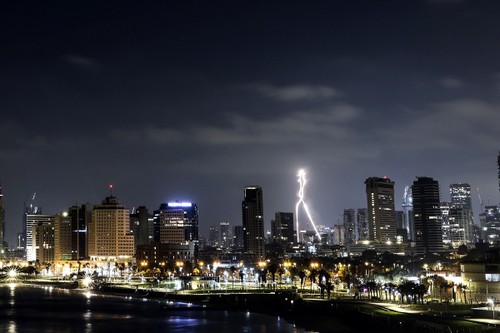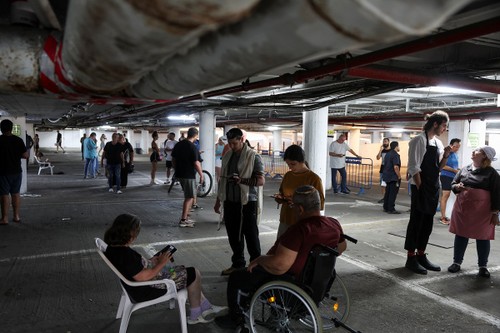 An interceptor flies in the sky as missiles from Iran are fired to Israel, as seen from Tel Aviv, Israel, June 17, 2025. (Photo: REUTERS/Jamal Awad) An interceptor flies in the sky as missiles from Iran are fired to Israel, as seen from Tel Aviv, Israel, June 17, 2025. (Photo: REUTERS/Jamal Awad) |
In response to Israel's attack, Iran launched a strong retaliatory offensive against several Israeli cities, leading to escalating airstrikes over the past days.
Escalating retaliation
Israel’s preemptive strike on Iran on June 13 marked the most severe outbreak in their long-standing adversarial relationship with irreconcilable differences on multiple issues, incluing religion, Palestinian rights, and regional interests. Prime Minister Benjamin Netanyahu said Israel had to act to prevent Iran from acquiring nuclear weapons, which Israel sees as an "existential threat."
Iran has denied any intention of developing nuclear weapons, insisting on its sovereign right to develop civilian-use nuclear capabilities. Tehran considers Israel’s military action a clear violation of its sovereignty.
With both countries refusing to compromise and US-Iran nuclear talks stalled for over two months, Israel’s hardline government opted for military strikes. Iran retaliated with its largest-ever missile attacks on several Israeli cities.
As of June 17, preliminary reports showed about 300 Iranian and 40 Israeli fatalities, with thousands more injured and major infrastructure destroyed on both sides. Observers say the two are on the brink of a full-scale war, with a high risk of losing control.
Negar Mortazavi, a Senior Fellow at the Center for International Policy (CIP) in Tehran, said: “From the Iranian perspective, they probably should have some kind of a balance, show some form of response that would basically prevent an escalation of these attacks. But at the same time, make sure they calibrate that response in a way that it doesn't escalate into a bigger war. And where that balance lies, I don't exactly know.”
In addition to risking a regional war, the violence has dashed hopes of resolving Iran’s nuclear issue through diplomacy.
Andrew Miller, former Deputy Assistant Secretary of State for Israeli-Palestinian Affairs and now a senior fellow focused on the Middle East at the Center for American Progress (CAP), said: “I don't think these attacks will hurt negotiations in Gaza. What they do hurt is the prospect of negotiations over Iran's nuclear program. And that really is the rub of the matter, that what Israel has done is still a temporary accomplishment. A longer term solution to Iran's nuclear program can only be achieved diplomatically and it's very hard to see the Iranians wanting to negotiate under these circumstances.”
 People take shelter amid missile attacks from Iran, in Tel Aviv, Israel, June 17, 2025. (Photo: REUTERS/Ronen Zvulun) People take shelter amid missile attacks from Iran, in Tel Aviv, Israel, June 17, 2025. (Photo: REUTERS/Ronen Zvulun) |
What is the US’s role?
A major question, and potentially a decisive factor, is the role of the US, Israel’s closest ally. Most military analysts say that Israel's campaign, including attacks on Iran’s underground nuclear facilities at Natanz and Fordow, would be ineffective without direct US military involvement.
Brian Katulis, an analyst at the US’s Middle East Institute, said the Trump administration faces two tough choices: to put pressure on both sides to halt the conflict and resume nuclear talks with Iran, or join Israel’s military campaign.
President Trump has repeatedly emphasized his preference for diplomatic solutions and urged Iran to accept a US-initiated nuclear deal. But on Monday the US deployed an additional aircraft carrier strike group to the Middle East, and Trump shortened his schedule at the G7 Summit to return home for discussions on the Middle East situation.
Mr. Katulis said: “President Trump came back to office in 2025 stating that he wanted to end kinetic wars, wars like on Ukraine, ending the war in Gaza, and also ending and avoiding big Middle East wars. He has not succeeded in doing that. And I think this action by Israel demonstrates how unsuccessful he's been. He had hoped and put a lot of stock in diplomacy with Iran, but they weren't getting there.”
Many see diplomacy as the only way to keep the conflict from escalating. In a phone call with President Trump over the weekend, President Vladimir Putin emphasized the need for an immediate ceasefire and signaled Russia’s willingness to mediate.
At the G7 Summit, the leaders of France, Germany, the UK, and Italy also pressured the US President to push for a diplomatic resolution between Israel and Iran. French President Emmanuel Macron said President Trump has proposed a ceasefire, and European countries are ready to rejoin Iran’s nuclear talks, which have been frozen since Trump in his first presidential term canceled the P5+1 agreement signed in 2015 by Iran with the US, UK, France, Germany, Russia, and China.
Observers warn that any diplomatic effort must begin immediately, before the confrontation spirals out of control.